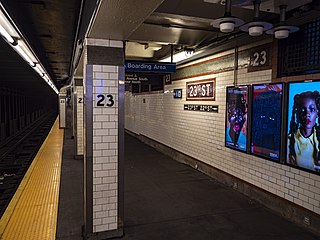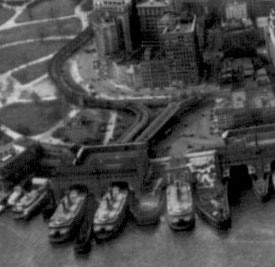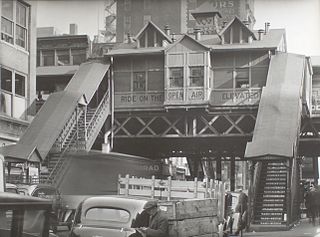
The 23rd Street station is a local station on the IRT Lexington Avenue Line of the New York City Subway. Located at the intersection of Park Avenue South and 23rd Street in Gramercy Park and Flatiron District, Manhattan, it is served by 6 trains at all times, <6> trains during weekdays in the peak direction, and 4 trains during late night hours.

The South Ferry station was an elevated station at the southern terminal of the IRT Second, Third, Sixth and Ninth Avenue Lines. It was located next to Battery Park at the lower tip of Manhattan, New York City. Two tracks came from the combined Second and Third Avenue Lines, and two from the Sixth and Ninth Avenue Lines, making four tracks at the terminal, with platforms on the outside and between each pair of tracks.

The 23rd Street station is a local station on the IND Sixth Avenue Line of the New York City Subway, located at the intersection of 23rd Street and Sixth Avenue in Manhattan. It is served by the F train at all times, the M train during weekdays, and by the <F> train during rush hours in the peak direction. This station and 14th Street are the only two local stations on the Sixth Avenue Line.

The Court Square–23rd Street station is a New York City Subway station complex on the IND Crosstown Line, the IRT Flushing Line and the IND Queens Boulevard Line. The complex is located in the vicinity of One Court Square in Hunters Point and Long Island City, Queens, and is served by the 7, E, F, and G trains at all times; the <7> express train during weekdays in the peak direction; and the <F> train during rush hours in the reverse-peak direction.
The Battery Place station was a station on the demolished Ninth Avenue and Sixth Avenue elevated train lines in Manhattan, New York City. It was located at the southern terminus of Greenwich Street at the north end of Battery Park.
The Rector Street station was on the demolished IRT Sixth Avenue Line in Manhattan, New York City. It had three tracks and two side platforms. It opened on June 5, 1878, served by trains from the IRT Sixth Avenue Line, and was one block east of Rector Street El Station on the IRT Ninth Avenue Line. In 1918, Brooklyn Rapid Transit Company built the Broadway Subway through Manhattan and added a station at Rector Street, which served as competition for the 6th Avenue Line station. The el station closed on December 4, 1938. The next southbound stop was Battery Place on the IRT Ninth Avenue Line. The next northbound stop was Cortlandt Street.

The Cortlandt Street station was a station at Church Street on the demolished IRT Sixth Avenue Line in Manhattan, New York City. It had 3 tracks and two side platforms. It was served by trains from the IRT Sixth Avenue Line and opened on June 5, 1878. It closed on December 4, 1938. The next southbound stop was Rector Street. The next northbound stop was Park Place.

The Park Place station was a station on the demolished IRT Sixth Avenue Line in Manhattan, New York City. It had 2 tracks and two side platforms. It was served by trains from the IRT Sixth Avenue Line and opened on June 5, 1878. It closed on December 4, 1938. The next southbound stop was Cortlandt Street for local trains, and Battery Place for express trains. The next northbound stop was Chambers Street for all trains. The Chambers Street – World Trade Center / Park Place station complex can be found within the vicinity of the former elevated railroad station.
The Chambers Street station was a station on the demolished IRT Sixth Avenue Line in Manhattan, New York City. It had two tracks and two side platforms. It was served by trains from the IRT Sixth Avenue Line and opened on June 5, 1878. It closed on December 4, 1938. The next southbound stop was Park Place. The next northbound stop was Franklin Street. The Chambers Street – World Trade Center / Park Place station complex can be found within the vicinity of the former elevated railroad station.
The Grand Street station was a station on the demolished IRT Sixth Avenue Line in Manhattan, New York City. It had two tracks and two side platforms. It was served by trains from the IRT Sixth Avenue Line and opened on June 5, 1878. It closed on December 4, 1938. The next southbound stop was Franklin Street. The next northbound stop was Bleecker Street.

The 14th Street station was a station on the demolished IRT Sixth Avenue Line in Manhattan, New York City. It had two tracks and two side platforms, and was served by trains from the IRT Sixth Avenue Line. The station opened on June 5, 1878, and was designed by famed Hudson River School painter Jasper Francis Cropsey, a trained architect. Beginning in 1907, the station had a connection to the 14th Street subway station of the Hudson and Manhattan Railroad. It closed on December 4, 1938. The next southbound stop was Eighth Street. The next northbound stop was 18th Street. Two years later the station was replaced by the IND Sixth Avenue Line platforms of the 14th Street / Sixth Avenue Subway station complex.
The 18th Street station was a station on the demolished IRT Sixth Avenue Line in Manhattan, New York City. It had two tracks and two side platforms. It was served by trains from the IRT Sixth Avenue Line and opened in 1892. It closed on December 4, 1938, and was not replaced with a subway station on the IND Sixth Avenue Line. However, one block north of the station there was a 19th Street station on the Hudson and Manhattan Railroad that operated between 1908 and 1954. The next southbound stop was 14th Street. The next northbound stop was 23rd Street.

The 28th Street station was a station on the demolished IRT Sixth Avenue Line in Manhattan, New York City. It had two tracks and two side platforms. It was served by trains from the IRT Sixth Avenue Line. This station opened in 1892. From 1910 to 1937 it also had a connection to the 28th Street. It closed on December 4, 1938. The next southbound stop was 23rd Street. The next northbound stop was 33rd Street.

The 33rd Street station was a station on the demolished IRT Sixth Avenue Line in Manhattan, New York City. It had two tracks and two side platforms. It was served by trains from the IRT Sixth Avenue Line. This station opened on June 5, 1878, and closed on December 4, 1938. The next southbound stop was 28th Street. The next northbound stop was 38th Street. The station was eventually replaced by the 34th Street–Herald Square Subway station complex one block north.

The 42nd Street station was a station on the demolished IRT Sixth Avenue Line in Manhattan, New York City. It had 2 tracks and two side platforms. It was served by trains from the IRT Sixth Avenue Line, and was located near sites such as the New York Public Library headquarters, Bryant Park, and the New York Hippodrome. The station opened on June 5, 1878, and closed on December 4, 1938. The next southbound stop was 38th Street. The next northbound stop was 50th Street. Two years later, the rapid transit needs of the intersection were replaced by the IND Sixth Avenue Line platforms of the 42nd Street–Bryant Park/Fifth Avenue subway station complex.
The 50th Street station was a station on the demolished IRT Sixth Avenue Line in Manhattan, New York City. It had two tracks and two side platforms. It was served by trains from the IRT Sixth Avenue Line and opened on June 5, 1878. It closed on December 4, 1938. The next southbound stop was 42nd Street. For some trains, the next northbound stop was 58th Street Terminal until 1924, while for other trains, the next northbound stop was Eighth Avenue. For express trains, the next northbound stop was 66th Street on Ninth Avenue. Two years later after the station closed, it was replaced by the nearby underground 47th–50th Streets–Rockefeller Center subway station.
The 53rd Street and Eighth Avenue station was a station on the demolished IRT Sixth Avenue Line in Manhattan, New York City. It was built in 1881 by the Manhattan Railway Company as part of an effort to connect the northern end of the Sixth Avenue Line to the Ninth Avenue Line. It had three tracks and two side platforms, and was served by trains from the IRT Sixth Avenue Line. As a result, it became the last station on the Sixth Avenue Line before merging at a sharp curve with the Ninth Avenue Line. On September 11, 1905, 12 people were killed and 42 injured when a train jumped over the rails at the curve on 53rd Street between the Ninth Avenue 50th Street and 59th Street stations. In 1932, the Independent Subway System built the 50th Street Station three blocks to the south on the Eighth Avenue Subway with an additional lower level in 1933, thus rendering the elevated station and line obsolete. It closed on December 4, 1938. The next southbound stop was 50th Street. The next northbound stop was 59th Street.
The 38th Street station was a station on the demolished IRT Sixth Avenue Line in Manhattan, New York City. It had two tracks and two side platforms. It opened in late 1913, as an infill station and closed on December 4, 1938. The next southbound stop was 33rd Street. The next northbound stop was 42nd Street, although a now-closed passage under Sixth Avenue running between the 42nd Street–Bryant Park and 34th Street–Herald Square stations had exits to 38th Street. High crime along the passage's five-block stretch was widely cited as the reason for its closure in 1991.

The 14th Street/Sixth Avenue station is an underground New York City Subway station complex in Greenwich Village and Chelsea, Manhattan, on the IRT Broadway–Seventh Avenue Line, the BMT Canarsie Line and the IND Sixth Avenue Line. It is located on 14th Street between Sixth Avenue and Seventh Avenue. It is served by the 1, 2, F, and L trains at all times, by the 3 train at all times except late nights, the M train during weekdays, and the <F> train during rush hours in the peak direction.











